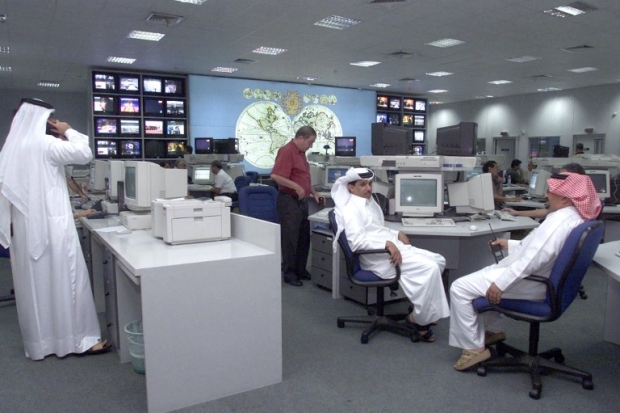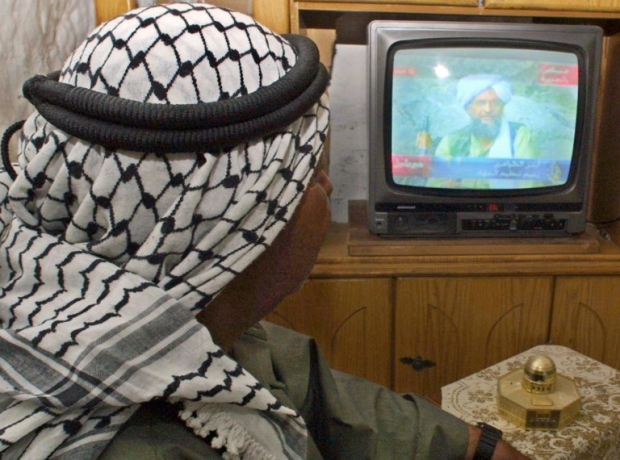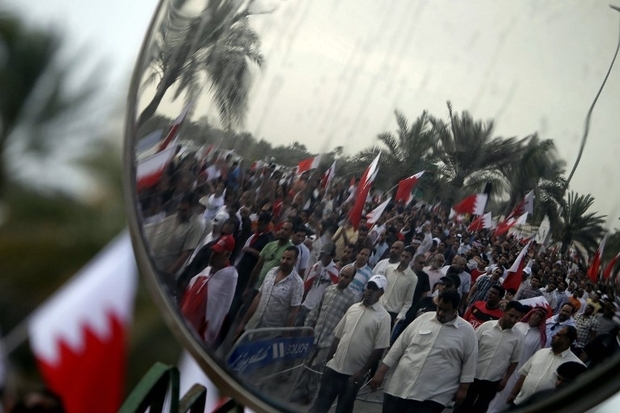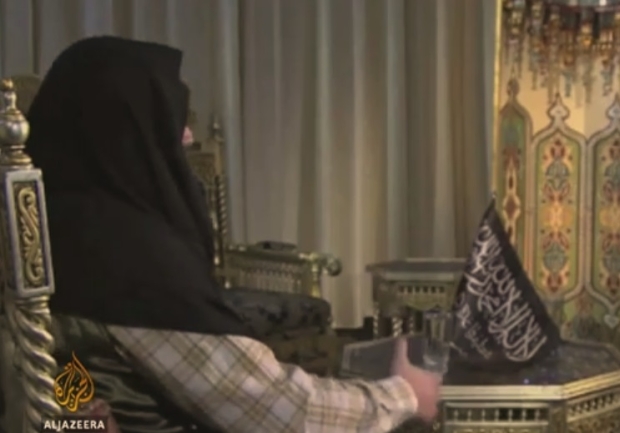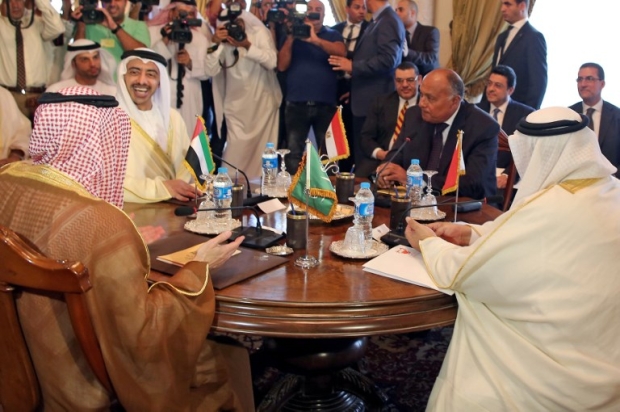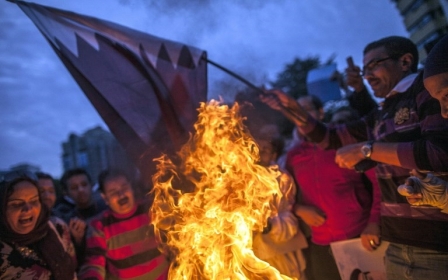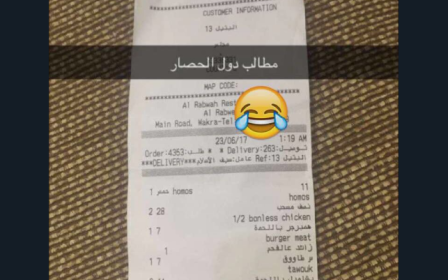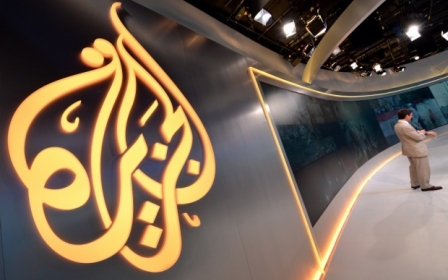Al Jazeera: Far from perfect, but still a symbol of hope
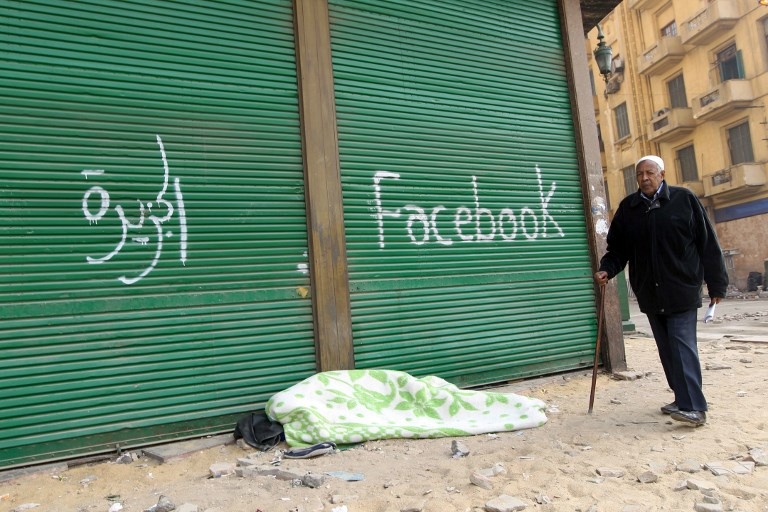
Qatar’s capital Doha was once recognised as a gathering place for political and religious figures of all stripes from across the political spectrum in the Middle East. It was classified as the moderate face of the Gulf and the main mediator in the Israel-Palestine dispute.
Indeed, after its launch in 1996, Al Jazeera (AJ) played a key role in crafting this image. For the first time in the Middle East, a news channel from the non-Western world challenged the "established" media with its professional, insightful and thorough coverage.
The so-called Arab uprisings in the Middle East not only elevated AJ’s role regionally, but also globally. It was an opportunity to challenge dictatorships in the region and create a new narrative.
Although Qatar is not an electoral democracy, and citizens and expatriates who make up four-fifths of the population experience limited civil liberties and political rights, Al Jazeera will remain a significant force if it can clear its name and continue to be a symbol of free and fair journalism.
One organisation, two messages
In 1991, CNN was one of the main broadcasters reporting the First Gulf War. The outlet’s correspondents fully embedded with the US army on the frontlines, a new way of reporting later used by AJ and other operations.
Despite the fact that both Arabic and English channels are under the umbrella of the Al Jazeera network, they do not share similar editorial lines
A decade later, when the US-led war on Afghanistan began, AJ’s Arabic news channel became a key source of reporting from within the country. What made it distinctive was the channel's exclusive access to the speeches of al-Qaeda’s leader Osama bin Laden.
More recently, as the initial wave of uprisings and euphoria engulfed the Middle East in 2011, AJ played a key role in publicising the historic protests. The Arabic-language satellite channel and AJ Mubashir Misr, which broadcast Egyptian news around the clock from an office in Cairo, covered the street protesters who demanded the resignation of president Hosni Mubarak. The coverage of both channels was seen as crucial to the mobilisation of the "Arab street" across the region.
Despite the fact that both Arabic and English channels are under the umbrella of the Al Jazeera network, they do not share similar editorial lines. The Arabic channel is supportive of high-profile Muslim Brotherhood (MB) preachers such as Yusuf al-Qaradawi who has close relationships to the Qatari ruling family.
While there is little criticism on the channel of Qatar, its regional coverage sparks vibrant discussions. AJ English follows a more liberal line, which adheres to Western norms of objectivity, along with a counter-hegemonic perspective, a crucial approach which has challenged the Orientalist coverage of the mainstream media and, as a result, earned the channel credibility.
Doha has been used Al Jazeera Arabic as a soft power tool to influence public opinion and sometimes that pursuit has led to less-than-journalistic outcomes
Yet AJ Arabic’s approach needs to be examined carefully. It has come under criticism for giving airtime to Qaradawi and others Islamist preachers and leaders affiliated with the MB, Hamas or other Islamist groups from other Gulf countries, especially Saudi Arabia which itself exports Wahhabi ideology across the region. Indeed, the MB’s evolving influence in the region, which is backed by Qatar’s political and support, is seen as a threat to stability by Saudi Arabia and UAE.
The Arabic-language channel, unlike AJ English, has also come under fire for inviting guests on who offer sectarian views that go unchallenged. Clearly, Doha has used Al Jazeera Arabic as a soft power tool to influence public opinion and, sometimes, that pursuit has led to less-than-journalistic outcomes.
Towing lines
Whereas AJ as a whole was a symbol of a post-dictatorship narrative in the region, in some cases – like that of Bahrain and Yemen - they have towed particular lines because of regional interests and pressures.
When uprisings in Bahrain started in March 2011, regional disagreements within the GCC led both the English and Arabic language channels of the Qatari-funded news network to play down the unrest, even as it sent troops to the country as part of its commitment as a Gulf Cooperation Council member.
Although there was already criticism that AJ was being used as a propaganda tool for Qatar, the channel’s coverage – or lack thereof – of these uprisings increased this perception. In Bahrain, AJ’s coverage of the neighbourhood revolt was a potential threat to Qatar, ruled by a Sunni family, as Bahrain and its own Sunni ruling family faced a potential sectarian conflict as the upheaval was supported by the country’s Shia majority.
From the perspective of the GCC countries, the success of the uprisings in Bahrain could have been the beginning of the end for the Sunni domination in the region and so they closed rank. One analyst even suggested that Qatar pushed Al Jazeera to tone down its coverage of Gulf uprisings in order to “be rewarded with the coveted post of secretary-general of the Arab League”.
In Yemen, the Saudi-led coalition’s war against the Houthis which began in 2015 brought up the same questions again. AJ Arabic’s Yemen coverage was Saudi friendly. Coincidentally and until recently, Qatari armed forces were officially part of Riyadh’s coalition. Still, while AJ’s reporting in Yemen has been largely favourable for the Saudis, there has been some nuance. For example, in April, when 12 Saudi soldiers were killed in a helicopter crash, AJ – unlike Saudi-backed media – did not refer to the soldiers as martyrs.
Whereas AJ’s Bahrain coverage was more ideological, not taking a completely pro-Saudi line on Yemen suggested that Qatar’s interests in the conflict are more political than sectarian. Given Qatar’s investments in Yemen and the key mediation role it played between the Houthis and the government from 2004 to 2010, it’s clear that Emir Tamim bin Hamad al-Thani wants stability in the country.
'Al Jazeera Effect'
Nevertheless, there is no doubt that the pan-Arab news channel provided hope for millions of people after the fall of Mubarak, seen as the strongest leader in the region having ruled for 30 years. During this period, many AJ journalists for both Arabic and English channels paid a steep price for their work: jailed, bureaus closed and some wounded or even killed.
Many AJ Arabic and English journalists paid a steep price for their work: jailed, press accreditations withdrawn, bureaus closed and some wounded or even killed
This only enhanced the network’s influence in what came to be known as the “Al Jazeera effect”. Representing the voice of the "global south" and giving oppressed populations a platform to speak truth to power, Al Jazeera differentiated itself from its competitors.
Despite the fact that Qatar is a constitutional monarchy, the country and AJ’s editorial line supported democratic and armed opposition movements, which has raised criticism in some cases such as Syria. When the network interviewed Mohamad al-Golani, the leader of Nusra Front in May 2015, AJ was criticised for being sympathic and giving a platform to terrorism and further fuelling radical groups in Syria.
Regional power gamble
Today, the channel faces a new challenge. The so-called “GCC crisis” has led Saudi Arabia, the UAE, Bahrain and Egypt to cut off diplomatic relations with Qatar. The rift has also shone a spotlight on AJ. The four countries set out 13 demands for Qatar to fulfil, including shutting down AJ and its affiliate stations.
AJ’s impact is clear given the investments other Gulf countries have made in their own news networks since its launch
Qatar, they argue, “supports terrorism” through its wrong-headed regional and international policies. For Saudi and the UAE, AJ is the main news outlet for the MB which they have declared as a terrorist organisation. The success of the MB in the first democratic elections in Egypt brought the political Islamist movement to the fore. Both monarchies are fearful that a similar movement may one day topple them. This is the key driver of Saudi and UAE motivations behind the pressure they have placed on Qatar, not terrorism.
Accusing Qatar of supporting terrorism as a result of its support for the MB and Hamas has put much of the GCC leadership at odds with the supportive mood in the Arab street that both movements enjoy.
What is really happening right now is a struggle for regional independence. Saudi’s new crown prince, Mohammad Bin Salman, and Mohammed Bin Zayed, crown prince of Abu Dhabi, are trying to redesign the region, supported by US President Donald Trump, who is trying to play a key role in the Middle East by backing Saudi Arabia and the UAE's vision of the region.
When it comes to the media, AJ’s impact is clear given the investments other Gulf countries have made in their own news networks since its launch. In 2003, Dubai-based Al Arabiya was launched by the Saudi broadcaster Middle East Broadcasting Center (MBC). Media mogul Rupert Murdoch and the UAE co-own Sky News Arabia, launched in 2012, another example of a network that aims to overtake AJ’s role in the Arab world.
Collective conscious
In fact, the GCC crisis can be seen as revenge for the Egyptian revolution in 2011 and its aftermath. Qatar is under attack because its regional and foreign policy has dared to be independent from other GCC countries and the news outlet it supports has criticised neighbouring Gulf dictatorships – and they fear any kind of criticism that could impact the stability of their ruling monarchies.
Whether they get their news from AJ or Sky Arabia or the New York Times, how will transnational communities use their knowledge for future generations?
Yet aside from this political maelstrom and for all its faults, attacking AJ means silencing a young generation that questions the state of affairs in the region. This generation’s main news sources are not the mainstream media anymore but short, critical and to-the-point journalism, in other words, counter-hegemonic media.
People still believe that this kind of reporting can bring bottom-up change and create a collective consciousness. The power struggle continues over discourse and rhetoric, but the main question is, whether they get their news from AJ or Sky Arabia or the New York Times, how transnational communities will use their knowledge and consciousness to set the narrative for future generations.
- Taner Dogan is a senior consultant at TRT World, PhD Researcher at City, University of London, and member of the Chatham House and International Studies Association. Taner’s MA thesis was about Al Jazeera’s role in mobilising the ‘Arab street’ during the Egyptian revolution in 2011 which he conducted both in Qatar and Egypt. He tweets @tnrdgn.
The views expressed in this article belong to the author and do not necessarily reflect the editorial policy of Middle East Eye.
Photo: An Egyptian anti-government demonstrator sleeps on the pavement under spray paint that reads "Al-Jazeera" and "Facebook" at Cairo's Tahrir Square on 7 February 2011 on the 14th day of protests calling for the overthrow of President Hosni Mubarak (AFP).
This article is available in French on Middle East Eye French edition.
New MEE newsletter: Jerusalem Dispatch
Sign up to get the latest insights and analysis on Israel-Palestine, alongside Turkey Unpacked and other MEE newsletters
Middle East Eye delivers independent and unrivalled coverage and analysis of the Middle East, North Africa and beyond. To learn more about republishing this content and the associated fees, please fill out this form. More about MEE can be found here.



